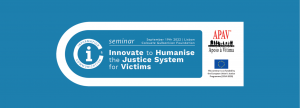
The Infovictims III Final Conference will take place in Lisbon, on September 19th, at the Calouste Gulbenkian Foundation. The conference will be the closing event of the Infovítimas III Project, promoted by APAV – Portuguese Association for Victim Support, between the years 2020 and 2022.
This article has been published by APAV – Portuguese Association for Victim Support. Please find the original article here.
THE VENUE
Founded over 50 years ago, the Calouste Gulbenkian Foundation is one of the most important European foundations, developing a wide range of activities in Portugal and abroad through its own projects or in partnership with other entities, and through the award of grants and scholarships. The Foundation has branches in Paris and London, cities in which Calouste Gulbenkian lived.
At its headquarters in Lisbon, the Foundation has a Museum, a Modern Art Centre and an Art Library, as well as an Orchestra and Chorus that perform throughout the year as part of an international music season.
It holds individual and collective exhibitions, promotes international conferences, and trainings, and organises an extensive programme of educational activities for children and adults. It distributes subsidies and scholarships for training in Portugal and abroad and supports programmes and projects of scientific, educational and artistic nature. It carries out an intense publishing activity, mainly through its plan of university textbook editions. It promotes and stimulates development aid projects with the Portuguese-speaking African countries and Timor-leste. It promotes Portuguese culture abroad and has also developed a programme to preserve the testimonies of the Portuguese presence in the world. In parallel to its activities in Portugal and abroad to promote Portuguese culture, the Foundation develops a programme of activities for the Armenian Diaspora to disseminate its language and culture.
More about Calouste Gulbenkian Foundation.
ABOUT THE PROJECT
The Infovictims project was launched in 2011 with the aim of contributing to the quantity and quality of information available to victims of crime – and to society in general – about the criminal justice system, their rights and how to exercise them. In each edition, the Infovictims project has expanded in partnerships and prospects, having this third edition included partners from Portugal, Germany, Greece, Ireland, Lithuania, Poland and Czech Republic.
After the success of the first two editions, we now celebrate, in this conference, the end of another edition of Infovictims in which the teamwork between all partners involved allowed the development and dissemination of information tools with essential contents to the full exercise of the rights of victims of crime.
INFOVICTIMS: A CLOSE LOOK AT INFORMATION
The right to information is the cornerstone of victims’ rights as it is contingent upon its full exercise that a victim may become aware of and benefit from the set of rights established at EU and national level. Furthermore, the criminal justice system is, in most countries, quite complex to understand for the common citizen and uses almost a language of its own. Bearing these two assumption in mind, APAV started an 11 years’ journey of making information on victims’ rights a reality, including for victims with disabilities.
In order to the right to information to be fulfilled, information must be delivered in a language and manner that all the victims can understand: the language used in the informative materials shall be easily apprehensible by everyone, there shall be informative tools adapted to the communication abilities of different groups of victims (like children, people with disabilities, etc.) and it must be available in several languages and means.
The Infovictims model of providing information to victims of crime is one where a victim of crime benefits from a set of information materials, in their mother-tongue, explaining in a very simple language, which are the rights provisioned and ways to exercise them, from as early as before the crime is reported to the competent authorities.
The tools developed within the scope of the Infovictims project were designed so that information could be made available in different formats and thus extend its reach to different target groups. As such, Infovictims materials can be found online – through the website and app – but also in physical format, through brochures, posters, posters and leaflets. The Infovictims website also has inclusive versions for people with visual or hearing disabilities.

